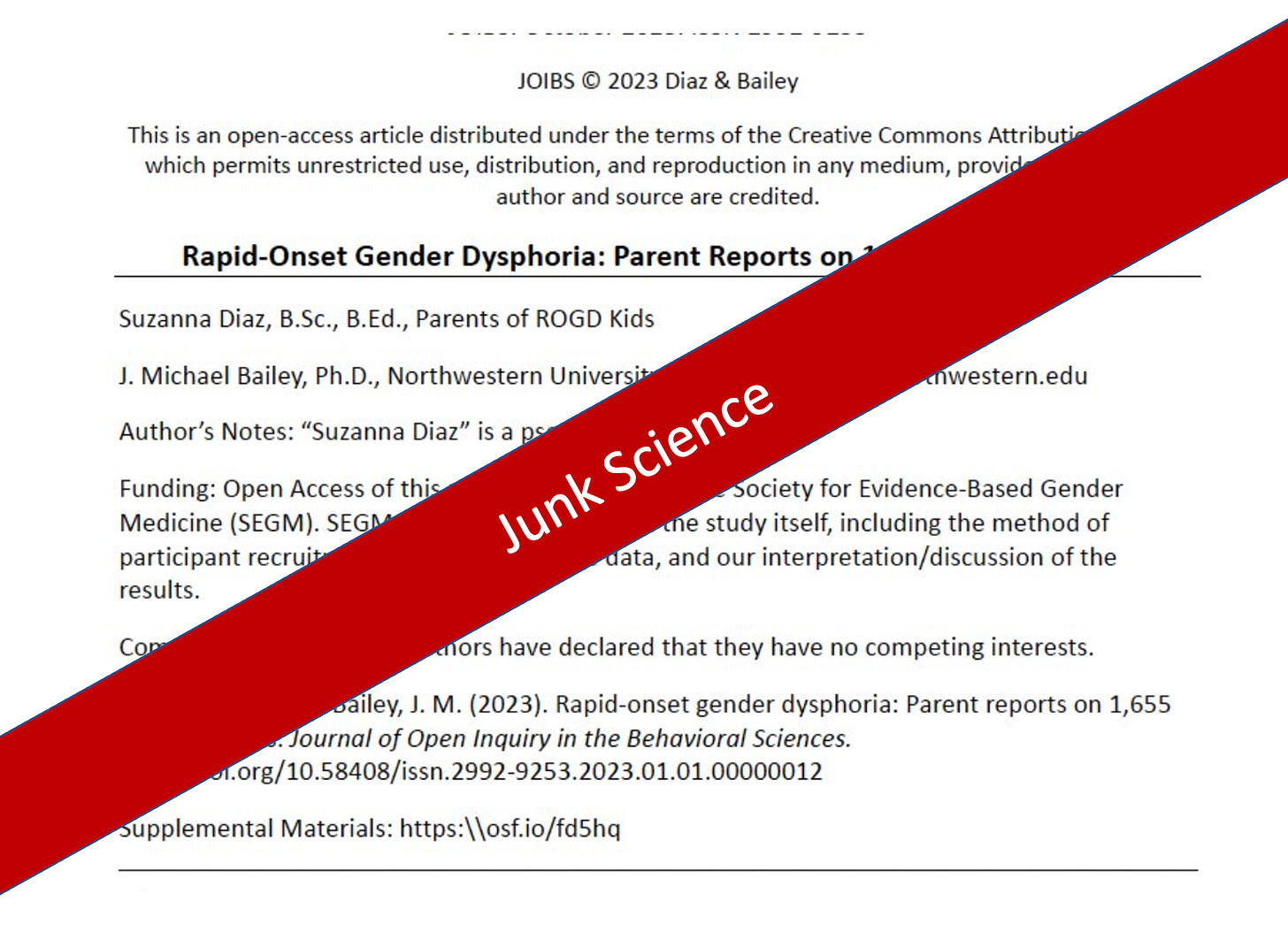Rating: Transsupportive, Erin in the Morning, October 23, 2023 (PDF archive) (HTML archive) (Take Action)
Action Recommendations
- Suggest/Improve an Action on the GenderMenace.net Action Portal!
Content Summary
“Rapid Onset Gender Dysphoria” Republished In Junk-Science Journal With A Shady Record

On Monday, several prominent anti-trans accounts announced the republication of a previously retracted paper supporting the notion of “Rapid Onset Gender Dysphoria,” a pseudoscientific explanation for gender dysphoria. Notably, the republication didn’t appear in the original journal, The Archives of Sexual Behavior, but rather in a nascent, scarcely known journal titled The Journal of Open Inquiry in the Behavioral Sciences. Established merely two months ago, this journal aims to challenge “progressive bias” and “academic capture” by “radicals and activists.” A closer look into the journal’s history exposes questionable practices and underscores yet another instance of those opposing gender-affirming care for trans youth erecting facades that mimic unbiased scientific rigor, only to camouflage an ulterior motive against transgender care.
The journal article, titled “Rapid Onset Gender Dysphoria: Parent Reports on 1655 Possible Cases,” was published by researcher Michael Bailey. Bailey is widely known for pushing harmful theories of transgender identity that center on the idea that a large number transgender people transition for sexual or fetishistic purposes. Additionally, he has collaborated with disgraced researcher Ken Zucker, whose clinic was shut down after accusations that it practiced conversion therapy. The article was retracted by Springer Nature following criticisms that it did not have IRB approval, lack of consent from participants, and a deeply biased sample collection method (responses were drawn from the anti-trans Parents Of ROGD Kids organization).
The article pushed the idea that a significant driver in transgender identification is “Rapid Onset Gender Dysphoria,” which centers on the idea that being trans is “socially contagious” and that transgender youth transition because they “following a trend.” This theory has been soundly refuted by numerous medical experts and major peer-reviewed journals. For instance, an article in the journal Pediatrics highlights that transgender youth, on average, are aware of their identity for 4 years prior to disclosing it to their parents. The perceived “rapid” disclosure is often because these youths hesitate to share due to apprehension. This and similar articles have resulted in over 60 psychological organizations calling for the dismissal of the term, citing a glaring absence of scientific backing.
News spread rapidly on Monday among many of the leading anti-trans voices declaring that the article had been republished. Transgender Trend, a platform that labels transgender identities as “a trend,” shared Bailey’s announcement on Twitter. Genspect, an organization linked to several policymakers opposing gender-affirming care—including architects of Florida’s trans prohibition—took up the news next. January Littlejohn, influential in shaping Florida’s “Don’t Say Gay” legislation, amplified the post, as did Helen Joyce, an author who has faced allegations of anti-semitism after stating that “a cabal of billionaires” was behind the transgender rights movement. It was even taken up by New York Times contributor Benjamin Ryan.
What was not shared, however, was much information about the journal in which the publication occurred. The journal, which is entitled The Journal of Open Inquiry in the Behavioral Sciences, was first announced in August by Lee Jussim and Cory Clark. The announcement post suggests that it was made due to “progressive bias” in academic journals. Another post suggests that that the organization responsible for the journal created it due to “academic capture” by “radicals and activists.” In that same post, Jussim states one of the biggest reasons for the organization’s existence is an opposition to Diversity, Equity, and Inclusion (DEI) initiatives, which Jussim refers to as “endorsement of and indoctrination into far left, even revolutionary, politics.” Jussim is the Editor-In-Chief of the journal.
The journal has not published many studies. At the time of the article’s publication, the journal has only released nine articles. Two of those nine articles are by Cory Clark, who serves as an associate editor for the publication (and who also announced the publication’s launch along with Jussim). One reader by the name of Igor points out that it appears Clark was unable to get the paper published anywhere, and so seemingly turned to publish at a journal she helped launch instead. This is, notably, not a common practice among scientific journals.
When confronted by this criticism, Jussim claimed that Clark only became an editor after her piece was reviewed. However, looking deep into Clark’s twitter history, two years ago, she conceived of just a concept:
“I am tempted to start my own ‘a-ok’ journal that publishes anything that meets a good enough standard with the approval of just one editor in less than one month. The current procedures are painfully inefficient… Actually, better idea: YOU start this journal so I can submit my papers there :)”
This post was liked by Matt Grawitch, who also holds one of the nine articles published on the “journal.” These are not the hallmarks of a reputable, credible journal and could even be seen as evidence of profound academic dishonesty. At minimum, it gives the appearance of undisclosed conflicts of interest.
Bailey’s publication in the journal, however, was announced as if it were published in credible journal by major names in the fight against transgender rights. When New York Times contributor Benjamin Ryan was informed about issues with the journal’s credibility, he merely reprinted Bailey’s denial of the journal’s issues, who indicated that he is a member of The Society for Open Inquiry in Behavioral Science, the organization responsible for the journal.
See Bailey’s response:
“The article did in fact undergo peer review. It was reviewed by two reviewers and the editor. As I said, we made changes due to the peer review. The journal was created because the organization that sponsors it (Society for Open Inquiry in the Behavioral Sciences—I am a member) believes that academic research is becoming more ideologically biased and less open. Politically-motivated retractions are one sign of that.”
Bailey is indeed a founding member of the organization and sits on the board. He helped found the organization in 2021, when the organization held its first conference after a grant from The Foundation for Individual Rights in Education (FIRE), an anti-DEI organization that rates campuses on “free speech” and has cited pronoun policies in Harvard’s last-place ranking. Bailey’s open-access publication was funded by the Society For Evidence In Gender Medicine, a fringe organization opposing trans care, which maintains it had “no role in the study itself.”
Again, the conflicts of interest are staggering. Could this journal’s entire purpose be a self-publication racket that is also being used to launder anti-trans organization talking points?
In recent times, the discourse opposing transgender individuals has been tainted with academic deceit. Groups like “Genspect” and the “Society For Evidence-Based Gender Medicine” have appropriated the veneer of scientific credibility while peddling pseudoscientific and politically-motivated agendas. Organizations like the American College of Pediatricians—a fringe conservative entity labeled a hate group by the SPLC—deliberately muddle the waters for legislators and the public, causing confusion with the American Academy of Pediatrics, a reputable institution representing over 60,000 professionals. It seems that dubious journals peddling spurious science and potential major conflicts of interest are becoming the newest arsenal in this campaign.


Leave a Reply